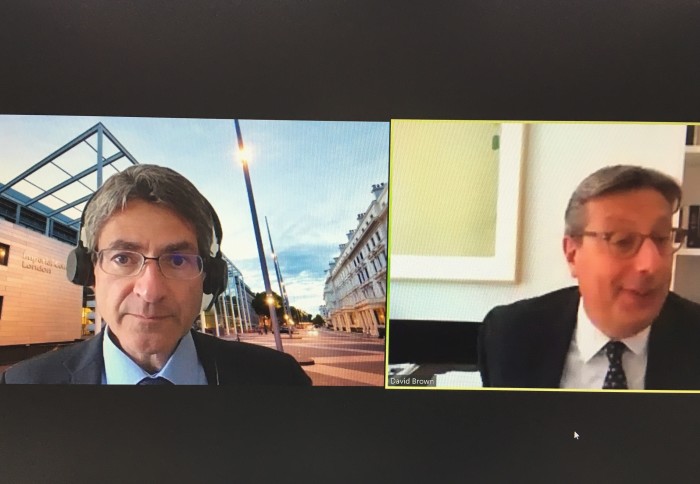Fear of coronavirus will ‘hold back economic recovery’

Professor Jonathan Haskel in conversation with David Brown, Director of Executive Education
Cautious consumers who are worried about unemployment and health risks, will hold back the economic recovery from COVID-19 said a leading economist.
This was the view of Jonathan Haskel, Professor of Economics at Imperial College Business School and a member of the Bank of England’s Monetary Policy Committee. He made the comments in a speech to an online audience of over 400 people including business leaders, policymakers and Imperial academics and alumni.
The speech was the focus of a webinar organised by Imperial’s Executive Education team, From Lockdown to Recovery – the economic effects of COVID-19, which is part of the new Imperial Future Matters webinar series.
Professor Haskel shared his insights into how economists have reacted to the global economic shock caused by COVID-19, which he described as “one of the most dramatic slowdowns in economic activity in recorded history”.
Cautious consumers
Discussing the current economic downturn, Professor Haskel expressed his concern about the economy “getting stuck” and recovering only slowly and undershooting the inflation target. He argued that people’s worries about catching the coronavirus were affecting their decision to go out and spend money and avoid activities with a social element such as going to pubs and restaurants.
“When the economy re-opens, customers might still fear infection and therefore stay away from consumption that has a social element to it, such as going to pubs and restaurants." Jonathan Haskel Professor of Economics, Imperial College Business School
Describing how the pandemic was a huge shock to public health, he said COVID-19 could be described by economists as a “supply shock”. This is the extent to which the economy can provide goods and services. For example, a closed restaurant can serve no-one and an opened one is only able to serve, say, half its customers due to social distancing.
Equally important he argued, was the behavioural response to the pandemic from consumers which he described as a “demand shock”. He said: “When the economy re-opens, customers might still fear infection and therefore stay away from consumption that has a social element to it, such as going to pubs and restaurants. It seems likely that such demand weakness will therefore drag on the economy and hold back the recovery.”
According to an analysis of people’s social spending habits, British consumers appeared less willing to spend money at pubs and restaurants than people in other countries at the equivalent points before and during the lockdown. Professor Haskel cited Google search data which he said reflected a “persistence in consumer risk-aversion and spending activity.”
The path to recovery
The path to economic recovery would depend on “the fear of infection, which in turn depends on the mix of public (e.g track and trace) and private (e.g screens in shops) health measures put in place to protect the public.” The extent to which these measures were implemented could lead to a new wave of competition and innovation as companies compete to offer safe environments for the public.
High unemployment was another factor which could impact the economic recovery which Professor Haskel described as “the fear of realisation of unemployment, as weak activity and capacity constraints on the operation of surviving businesses and insolvencies translate into a fall in the demand of labour.”
In a wide-ranging talk, Professor Haskel described the factors that economists are considering in their modelling of the recovery such as the sectors that have been affected, people’s attitude towards the health risk of the pandemic, the impact of furlough and the shift in people’s working patterns as more employees work from home.
A video of Professor Haskel’s presentation is available to watch on the Business School's website. The full speech is available to view on the Bank of England’s website.
For more information about upcoming webinars in the Imperial Future Matters series organised by the Executive Education team, please visit the Business School’s website.
Article text (excluding photos or graphics) © Imperial College London.
Photos and graphics subject to third party copyright used with permission or © Imperial College London.
Reporter
Laura Singleton
Communications Division